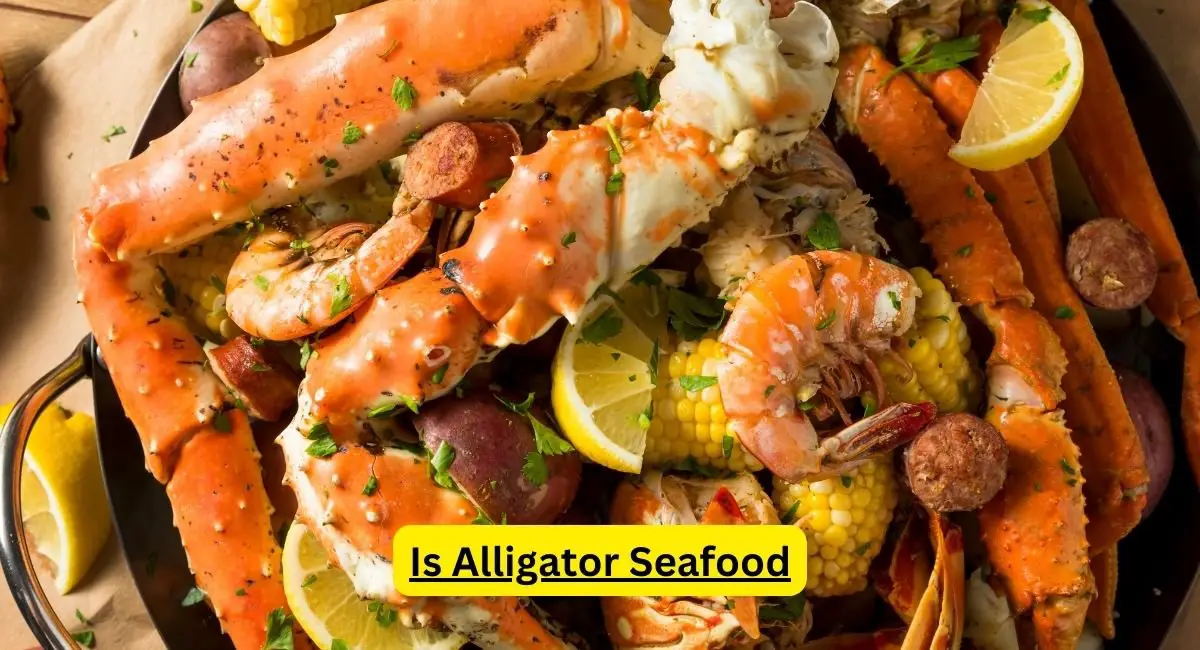Alligator is not considered seafood; it is classified as game or exotic meat. Alligators are freshwater animals associated with swamplands, not the sea.
In culinary context, seafood pertains to any form of sea life regarded as food by humans, primarily including fish and shellfish from oceanic environments. While alligator may often be found on menus alongside seafood items, especially in regions where they’re indigenous like the Southern United States, it’s from a distinctly different category.
Alligator meat is a unique ingredient, famed for its firm texture and flavor that’s often compared to chicken and rabbit. Offering high protein and low fat, it serves as a novel alternative for those looking to venture beyond conventional meats and the usual marine offerings.
Alligator Cuisine
Alligator meat has deep roots in various cultures. Long ago, native tribes in America valued it. Alligators were important for food and rituals. Alligator dishes reflect a rich history. These traditions continue today. Alligator meat is popular. People eat it in different parts of the world. In the United States, it’s a special dish in Louisiana. Other regions are also catching on. They enjoy alligator as an exotic option. Restaurants serve it in diverse styles. Grilled, fried, and in stews – alligator is versatile. People see it as a unique part of their dining experience. Its fame is growing globally. Alligator is on menus from the US to Asia.
Culinary Classification Confusion
The term seafood often leads to culinary classification confusion. It usually includes creatures from the sea. Alligators, on the other hand, live in freshwater. They are not typical seafood. Some may wonder if alligator is poultry. Yet, it’s not a bird either.
From a regulatory perspective, guidelines define things. These include what gets labeled as seafood. Alligators do not fit typical seafood categories. They are often seen as an exotic option. Chefs sometimes cook alligator like fish or chicken. But, rules classify it differently. FDA regulations put alligator under the fish label. This can be confusing.
| Food Type | Classification | Regulatory Label |
|---|---|---|
| Alligator | Not seafood or poultry | Labeled as fish by FDA |
Alligator Meat In Diet
Alligator meat is becoming a unique addition to diets. Rich in protein and low in fat, it’s a nutritious choice for many. It also includes valuable vitamins and minerals like iron and vitamin B12. Fans of this exotic meat prize its high omega-3 fatty acids, which are good for the heart.
Still, eating alligator meat raises health concerns. For instance, alligator meat may contain high levels of mercury because of their aquatic habitats. However, moderation and sourcing from reputable suppliers can help mitigate these risks. Remember, allergies to certain meats are also possible, so be mindful before trying.
Environmental Impact
Alligators can be farmed sustainably. This helps their numbers stay healthy. Farms use specific guidelines to protect the environment. These practices include controlled breeding and habitat management. This means they make sure not too many alligators are taken from the wild.
People work hard to keep alligator populations stable. They track the number of alligators. This is to make sure there are always enough alligators in the wild. Farms must follow rules that help alligator conservation. This is good for alligators and their homes.
Eating farmed alligators can be an eco-friendly choice. This is if the farm takes care of nature. We must pick places that put the environment first. By doing this, we help alligators and the planet.
Preparing Alligator Dishes
Alligator meat is a unique addition to many kitchens. Often not classified strictly as seafood, it remains a popular alternative protein. Chefs and food enthusiasts integrate alligator meat into traditional recipes, producing dishes with rich, gamey flavors that are reminiscent of both chicken and fish.
As part of fusion cuisine, alligator is becoming more widespread. Creative cooks incorporate it into tacos, stews, and even pizzas. This novel ingredient brings a twist to familiar meals, making it a hit in culinary innovation.
- Gumbo – A classic with a alligator twist
- Jambalaya – Bursting with spices and alligator chunks
Trying these alligator dishes will surely provide an unforgettable dining experience. Their distinct flavor profile adds excitement to the dining table.
Frequently Asked Questions Of Is Alligator Seafood
Is Alligator A Meat Or Seafood?
Alligator meat is considered game or exotic meat, not seafood. It comes from a reptile, not a sea creature.
Is Alligator Considered Seafood Allergy?
Alligators are not typically classified as seafood and are not a common allergen like fish or shellfish. However, individuals with seafood allergies should consult a doctor before consuming alligator meat.
What Kind Of Food Is Alligator Considered?
Alligator is considered exotic meat, often categorized as game or a wild food delicacy. It’s also a source of lean protein.
Is Crocodile A Seafood?
No, a crocodile is not considered seafood. Seafood typically refers to edible aquatic animals like fish and shellfish. Crocodiles are reptiles.
Conclusion
Navigating the culinary classification of alligator can be intriguing. It’s a matter of perspective; not quite fish, yet often grouped with seafood. Our exploration highlights a complex interplay of habitat, tradition, and taste. Remember, whether you consider it seafood or not, alligator remains a unique dish worth sampling for the adventurous palate.

